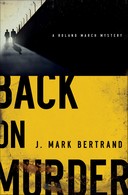
Back on Murder: A Roland March Mystery, by J. Mark Bertrand (Bethany House, 2010)
Roland March was a good detective, but now he’s on the way out. Something happened—a bad case, a personal tragedy, perhaps both—and he stopped trying.
His chief reluctantly assigns him to a gangland murder: one last chance, and one March discovers he desperately wants to take.
His superiors want him gone. He’s told to drop his brilliant hunch. Everything he tries only makes things worse. And it’s September, time for his wife’s annual depression.
Back on Murder is a fantastic read. Author J. Mark Bertrand nails the detective’s voice in this first-person novel. His descriptions are fresh, vivid, unique.
This is some of what March sees as he studies the first crime scene:
“The couch cushions blossom white with gunshots, exposed foam bursting from the wounds…. Evidence markers, chalk lines. imposing scientific regularity over the shell casings, the dropped firearms, the fallen bodies.” (page 12)
Here, March is arguing with his wife, Charlotte:
“We’re not yelling at each other. Not quite. But it’s a hissing little knife fight of a conversation, no dodging or parrying, just attack, attack, attack.” (page 42)
First person works for me as a mystery reader—whatever the sleuth or detective learns, I learn as well. Sometimes I can even piece a few clues together before he or she does, although not so much in this case.
But the novel is written in the present tense, a major turn-off for me. This is a fast-paced story, and once I was into it, my brain converted the action descriptions to past tense (that’s what it thinks is normal after 40+ years of reading). Then it would trip on a present-tense verb and throw me off the story’s rollercoaster. Not fun.
In the midst of assimilating the whole present-tense-fast-action thing, on page one I found a description of the murder victim: unique and well-written, but referring to his “wife-beater”. While I usually feel the political-correctness enforcers go overboard, this one should maybe have been stopped.
I was surprised a) that it was there, and b) that all readers would be expected to know the words mean a sleeveless, scooped-neck undershirt. If you didn’t know, I doubt you’d figure it out from context. You’d just be thinking about the dead guy having beaten his wife. This dead guy may not even have had a wife, so that’s a bad distraction from what he did have: enemies.
It’s hard for crime novels to have happy endings when they’re about death. March’s case resolves in a mostly satisfactory manner from his perspective. For readers, it a good ending. Our questions have been answered, some justice has been dealt, and there’s an open-ended issue that promises us future plots. Professionally, things are looking up for March. On a personal level, he and Charlotte are making progress.
March is a non-Christian protagonist for both Christian and general market police procedural lovers. Readers wanting a conversion scene for March need to look elsewhere. It wouldn’t be a realistic step for him at this point, but perhaps in a future novel. I found his non-faith gave him the opportunity to let Christians see how others may perceive us. He isn’t intentionally nasty, but he doesn’t get it. We all know people like that, and we need to understand them and to help them understand us.
J. Mark Bertrand is the co-author (with Deeanne Gist) of the romantic suspense, Beguiled. Back on Murder is so tightly-written that I can’t believe it’s his first solo novel.
Take a few minutes to read an excerpt from Back on Murder. And there’s an interesting Q&A with J. Mark Bertrand that promises:
“With the fallout from Back on Murder, and some new secrets coming to light, March’s next case might be the most disturbing he’s ever faced. The next book in the Roland March series, Pattern of Wounds, is schedule for release in Summer 2011.” [Read the full Q&A here.]
J. Mark Bertrand’s website is Back on Murder. Why write the novel in first-person, present-tense, with a non-Christian protagonist who’s somewhat of an anti-hero? In a guest-blogging post at best-selling suspense novelist Brandilyn Collins’ Forensics and Faith blog, he claims, “The Story Made Me Do It”.
I like Roland March, and I’m glad he’s back on murder. Present-tense narrative or no, I’ll be waiting to read Pattern of Wounds.
[Review source: Book has been provided courtesy of Baker Publishing Group and Graf-Martin Communications Inc. Available now at your favourite bookseller from Bethany House, a division of Baker Publishing Group.]
Like this:
Like Loading...
 Stranded, by Lorena McCourtney (Revell, 2006)
Stranded, by Lorena McCourtney (Revell, 2006)
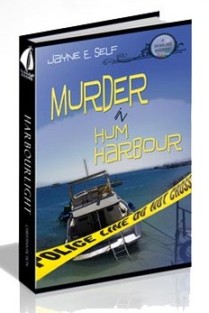

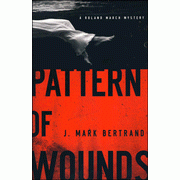
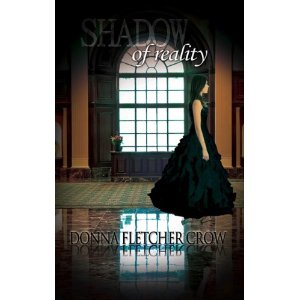



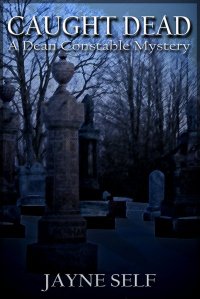 Caught Dead: A Dean Constable Mystery
Caught Dead: A Dean Constable Mystery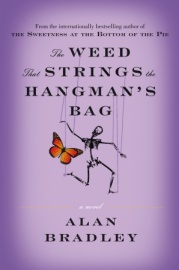 The Weed that Strings the Hangman’s Bag
The Weed that Strings the Hangman’s Bag